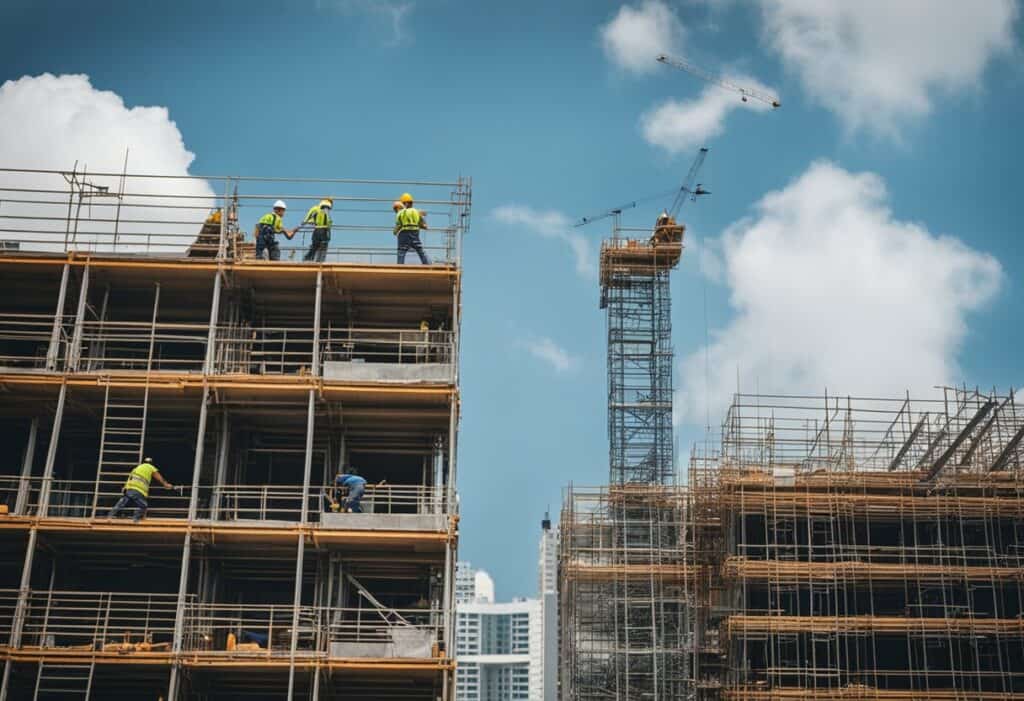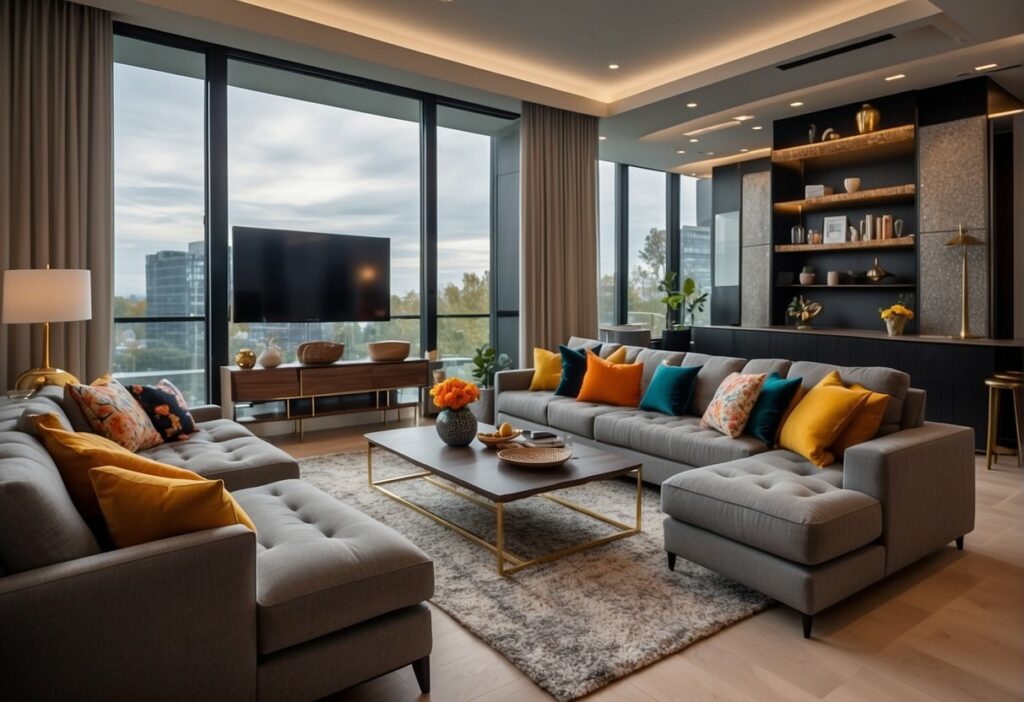How Long Does Renovation Take in Singapore? Find Out Here!
Are you planning to renovate your home in Singapore but have no idea how long it will take? Renovation can be a daunting task, especially if you’re not sure what to expect. But don’t worry, we’ve got you covered. In this article, we’ll answer the question of how long does renovation take in Singapore, so you can plan your dream renovation with confidence.

Renovation timelines can vary depending on the scope of the project, the type of property, and the level of customization. However, on average, a home renovation in Singapore usually takes around 3 months. This includes HDB and condominium renovations, which typically last for 2 months, and an additional month for homeowners to make decisions regarding home improvement that would otherwise be deferred until a later time. However, comprehensive renovations, including significant structural modifications, complete overhauls, or additions, can extend beyond 8 weeks, potentially ranging from 1 to 6 months.
Key Takeaways
- A home renovation in Singapore usually takes around 3 months, including HDB and condominium renovations that typically last for 2 months.
- Comprehensive renovations, including significant structural modifications, complete overhauls, or additions, can extend beyond 8 weeks, potentially ranging from 1 to 6 months.
- Timelines can vary depending on the scope of the project, the type of property, and the level of customization.
Planning Your Dream Renovation

Renovating your home can be an exciting and rewarding investment, but it can also be a daunting task. Planning is key to ensuring that your renovation project is a success. Here are some tips to help you plan your dream renovation.
Understanding the Renovation Process
Before starting your renovation project, it’s important to understand the renovation process. This includes understanding the different stages of the renovation process, such as planning, design, budgeting, and construction. It’s also important to understand the roles of the different professionals involved in the renovation process, such as interior designers and renovation contractors.
Selecting the Right Team
Selecting the right team is crucial to the success of your renovation project. This includes finding the right interior designer and renovation contractor to work with. Look for professionals who have a good track record and a portfolio of successful renovation projects.
Budgeting and Costs
Budgeting is an important part of the renovation process. It’s important to set a realistic budget and to consider all the costs involved in the renovation project. This includes hidden costs such as permits, rules and regulations, and unexpected expenses.
Design and Material Choices
Design and material choices are important considerations when planning your renovation project. This includes choosing the right tiles, appliances, lighting, furniture, and other materials that will be used in your renovation project.
Navigating Regulations
Navigating regulations is an important part of the renovation process. This includes understanding HDB renovation guidelines, obtaining renovation permits, and complying with noise rules and other regulations.
Setting Realistic Expectations
Setting realistic expectations is important to avoid stress and frustration during the renovation process. This includes understanding the timeline for your renovation project, the potential for disruptions due to COVID-19 or other factors, and the possibility of budget cuts.
Creating a Timeline and Checklist
Creating a timeline and checklist is an important part of the renovation process. This includes setting deadlines for different stages of the renovation process and creating a checklist of tasks that need to be completed.
Dealing with Potential Setbacks
Dealing with potential setbacks is an important part of the renovation process. This includes having open communication with your interior designer and renovation contractor, asking questions, and being prepared to make changes to your renovation plan if necessary.
Finalising the Details
Finalising the details is an important part of the renovation process. This includes reviewing your interior design proposal, selecting paint colours, and choosing flooring options.
Starting the Renovation
Starting the renovation is an exciting part of the renovation process. This includes demolition and hacking works, carpentry, plumbing, electrical wiring, and masonry.
Monitoring Progress and Quality
Monitoring progress and quality is an important part of the renovation process. This includes regularly reviewing the work done by your renovation contractor and ensuring that the renovation works are completed to a high standard.
Completing the Project
Completing the project is an exciting part of the renovation process. This includes adding finishing touches to your renovation project, such as painting and installing fixtures and fittings.
Post-Renovation Review
A post-renovation review is an important part of the renovation process. This includes reviewing your renovation project and providing feedback to your interior designer and renovation contractor.
Enjoying Your New Space
Enjoying your new space is the ultimate goal of your renovation project. This includes incorporating your new space into your lifestyle and making it a comfortable and functional part of your home.
Remember that renovation analysis paralysis can be a common issue, so it’s important to stay focused and keep moving forward with your renovation project. With the right planning and the right team, you can achieve your dream renovation and create a space that you’ll love for years to come.
Specific Considerations for Singaporean Homes

If you’re planning a renovation for your Singaporean home, there are some specific considerations you should keep in mind. From managing noise and neighbour relations to incorporating local trends and themes, here are some tips to help you navigate the process.
HDB vs Condominium Renovation
The type of property you own will have an impact on your renovation project. HDB and condominium renovations have different rules and regulations, so it’s important to be aware of these before you begin. For example, HDB flat owners need to comply with the HDB renovation guidelines, while condominium owners may need to obtain approval from the management corporation strata title (MCST) before undertaking any renovations.
Managing Noise and Neighbour Relations
Renovations can be noisy, and this can be a source of tension between neighbours. To avoid complaints, it’s important to manage noise levels and keep neighbours informed about your renovation plans. You should also be aware of the noise rules for HDB renovations, which prohibit noisy works on Sundays and public holidays.
If you receive a noise complaint from a neighbour, you can call the HDB renovation hotline or the police. However, it’s always better to try and resolve the issue amicably first.
Incorporating Local Trends and Themes
When planning your renovation, it’s a good idea to incorporate local trends and themes. For example, you might choose to use traditional Peranakan tiles in your kitchen or incorporate a Singaporean twist on the minimalist style.
To get inspiration, you can browse Pinterest moodboards or take a virtual reality home tour. It’s also a good idea to work with an experienced interior designer who can provide suggestions and show you their portfolio of work.
Finding Inspiration and Professional Guidance
If you’re not sure where to start with your renovation, there are plenty of resources available to help you. You can browse interior design magazines or websites, attend renovation fairs, or even visit showrooms to get ideas.
When choosing a renovation contractor, it’s important to do your research and choose a reputable company with experience in your property type. You should also be clear about your budget and expectations from the outset.
Kitchen-Specific Renovation Considerations
The kitchen is often the heart of the home, so it’s important to get it right. When planning your kitchen renovation, you should consider factors such as the layout, storage solutions, and the type of cabinets you want.
If you’re renovating an HDB or BTO flat, you may need to work within the constraints of the existing layout. However, there are still plenty of options for customising your kitchen to suit your needs.
Renovation for Different Property Types
Finally, it’s important to be aware of the specific considerations for different property types. For example, if you’re renovating a resale flat, you may need to consider the age and condition of the property, as well as any existing fixtures and fittings.
Similarly, if you’re renovating a condominium, you may need to obtain approval from the MCST before undertaking any works. It’s also important to be aware of any restrictions on the use of carpentry services, as some condominiums prohibit the use of power tools after a certain time of day.
Frequently Asked Questions

What’s the typical timeline for a 4-room HDB flat makeover?
A typical 4-room HDB flat makeover can take around 8-10 weeks. However, the exact duration may vary depending on the scope of the renovation project, the type of property, and other factors. To ensure that your renovation project stays on track, it’s essential to work with a reliable and experienced contractor who can provide you with a realistic timeline.
How swift is the approval process for HDB renovations?
The approval process for HDB renovations can take up to four weeks. This includes the time it takes to submit your renovation plans to HDB and wait for their approval. It’s important to note that any unapproved renovation works can lead to fines and legal issues. Therefore, it’s crucial to ensure that all your renovation plans are approved by HDB before you commence any work.
Can you enlighten me on the expected duration for a complete home refurbishment?
A complete home refurbishment can take up to 3-4 months. This includes the time it takes to plan the renovation, obtain necessary permits, and complete the actual renovation work. However, the duration may vary depending on the scope of the project, the size of the property, and other factors. It’s important to work with a contractor who can provide you with a realistic timeline for your home refurbishment project.
What’s the earliest time renovations can kick off in the day?
Renovations can start as early as 9 am in the morning. However, it’s important to check with your contractor and neighbours to ensure that the noise and disturbance caused by the renovation work do not disrupt the peace and tranquillity of the neighbourhood.
Could you provide a rundown of the payment milestones for remodelling works?
Payment milestones for remodelling works typically include an initial deposit, followed by payments at various stages of the renovation project. The exact payment milestones may vary depending on the contractor and the scope of the project. It’s important to discuss the payment milestones with your contractor before commencing the renovation work.
What are the essential steps to take prior to commencing renovation?
Before commencing renovation, it’s essential to obtain all necessary permits and approvals from the relevant authorities. You should also work with a reliable and experienced contractor who can provide you with a realistic timeline and budget for the renovation project. Additionally, it’s important to plan the renovation project carefully and ensure that you have a clear understanding of the scope of the project and the materials and resources required.



